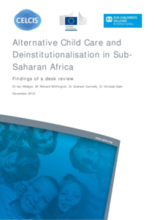Introduction
This desk review is part of a wider study commissioned to SOS Children’s Villages International by the European Commission. The overall study aims to map the issue of alternative care and deinstitutionalization in countries in Asia, South and Central America, and Africa. It also seeks to increase the evidence on child protection, alternative care and deinstitutionalization and on how this can be addressed, in order to potentially inform future initiatives in these continents, at country or regional level.
The study comprises three continental desk reviews and six field-based case studies. This report is the desk review on alternative care and deinstitutionalisation in Africa. It is accompanied by two country case studies: one focussing on Nigeria and one on Uganda. The results of the regional reports and case studies are synthesised in a report entitled Towards the Right Care for Children: Orientations for reforming alternative care systems - Africa, Asia, Latin America (European Union, Brussels, 2017).
Aim of the study
This study aims to provide a brief mapping and summary of existing knowledge on alternative care and deinstitutionalisation in Africa.
In order to understand what can be actively undertaken to promote and implement policy and practice for deinstitutionalisation, it is important to understand the situation of children who are at risk of losing, or have already lost, parental care as well as the alternative care options available. It is also important to know about elements of the child protection system that function to prevent unnecessary placements into care and the provision of suitable alternative care placements other than institutionalisation. To this end, this study has considered a body of literature that documents these factors, taking both regional and individual country perspectives.
The overall purpose of this study is to present an ‘introduction’ to alternative care systems in Africa. It is hoped that the scope of this study will contribute to a wider understanding of ‘institutional’ practices in Africa. To help achieve this, we provide context- specific definitions and concepts of institutionalisation and alternative care, and identify similarities, differences, challenges, and achievements in the countries under study.

